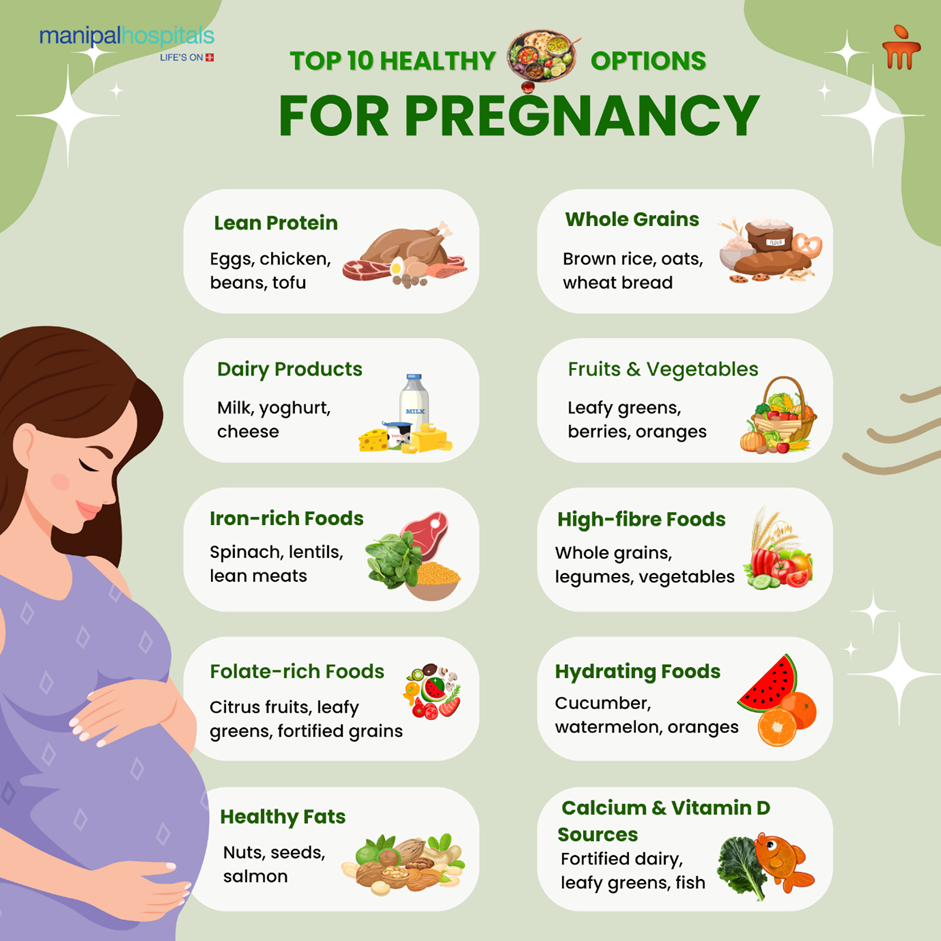.png)
A pregnancy food list is critical to the mother and the baby. Adequate nutrition during pregnancy provides essential nutrients that support fetal development and reduce the risk of complications. A balanced meal, protein-rich foods, and proper hydration form part of it. An expert obstetrician and gynecologist in Doddaballapur, Bangalore, discusses the ideal diet during pregnancy and what is best to consume for optimum health and development.
Synopsis
Importance of a Balanced Pregnancy Diet
A balanced pregnancy diet provides essential nutrients that support foetal development, maintain maternal health, and reduce the risk of complications. It should include a variety of nutrients to promote the development of the foetal brain, strengthen bones, and support the immune system.
Now let’s see why this balance is essential:
-
Nutrient-Dense Choices: Protein, vitamin and mineral-rich foods are important to the mother and the baby. Lean meats, fish, eggs, nuts, and seeds are included, which provide adequate amino acids and nutrients for tissue growth.
-
Weight Management: Weight gain at the right time throughout pregnancy will reduce complications. For example, women with a BMI of 18.5 - 24.9 should gain 11.5 - 16 kg, and women with a BMI over 25 should aim for 7 - 11.5 kg.
-
Avoiding Empty Calories: Foods rich in sugar and fats, such as fried foods and sugary drinks, have no nutritional value. Instead, choose rich source foods to enhance foetal growth and prevent excess weight gain.
-
Energy Needs: In the second and third trimesters, pregnant women need an additional 360-470 kilocalories daily, with extra protein, iron, and calcium. These nutrients support the baby's rapid growth and bone development.
Top 10 Healthy Food Choices for Pregnancy
Choosing the right foods during pregnancy can significantly affect your overall health. Here are some top picks:

-
Lean Protein: Essential for the baby's growth and tissue development. Include sources like eggs, chicken, lean meats, beans, nuts, and tofu, which provide high-quality protein and support muscle growth.
-
Whole Grains: Whole grains like brown rice, wheat bread, and oats are rich in fibre, iron, and B vitamins. They provide long-lasting energy and help prevent constipation, a common issue during pregnancy.
-
Dairy Products: Calcium-rich foods like milk, yoghurt, and cheese strengthen the baby’s bones and teeth. For optimal bone health, aim for 3-4 servings per day.
-
Fruits and Vegetables: Packed with essential vitamins, fibre, and antioxidants, they boost immunity and improve digestion. Include a variety of colours like leafy greens, berries, oranges, and bell peppers.
-
Healthy Fats: Omega-3 fatty acids in nuts, seeds, and fatty fish like salmon support brain development. DHA, a type of Omega-3, is especially crucial for the baby's brain and retina formation.
-
Iron-rich Foods: Iron is essential for maintaining healthy blood levels. Include lean meats, spinach, lentils, and fortified cereals to prevent anaemia and boost oxygen flow to the baby.
-
Folate-rich Foods: Folate and folic acid are vital for preventing neural tube defects. Leafy greens, citrus fruits, and fortified grains are excellent sources.
-
High-fibre Foods: Fibre prevents constipation and supports gut health. Whole grains, legumes, fruits, and vegetables are excellent sources of dietary fibre.
-
Hydrating Foods: Water-rich foods like cucumbers, watermelons, and oranges keep you hydrated and support amniotic fluid production.
-
Calcium and Vitamin D: These nutrients are critical for strong bones and teeth. To meet daily calcium needs, include fortified dairy, leafy greens, and fish.
Foods to Avoid During Pregnancy
While a healthy food list for pregnancy is essential, certain foods should be avoided for safety:
-
High Sugar and Empty Calorie Foods: These provide little nutritional value and contribute to excessive weight gain. Avoid sugary drinks, candies, and desserts.
-
High-Mercury Fish: Certain fish, like swordfish and king mackerel, contain high levels of mercury, which can harm the baby’s nervous system.
-
Unpasteurised Dairy Products: Raw milk and cheese can contain harmful bacteria like Listeria, which may cause severe infections.
-
Processed and Fried Foods: These foods are high in unhealthy fats and low in essential nutrients, which can increase the risk of gestational diabetes and excessive weight gain during pregnancy.
Managing Weight Gain During Pregnancy
Maintaining a healthy weight during pregnancy reduces the risk of complications like gestational diabetes and high blood pressure. Here’s how to manage it effectively:
-
Know Your BMI: Women with a BMI under 18.5 should gain 12.5-18 kg, while those with a BMI over 25 should limit their gain to 7-11.5 kg.
-
Eat Small, Frequent Meals: This helps manage nausea and prevents overeating.
-
Stay Active: Light physical activity, like walking or prenatal yoga, helps control weight gain and reduces stress.
-
Avoid Emotional Eating: Choose nutrient-dense snacks over sugary, high-calorie foods.
Conclusion
A healthy food plan for pregnancy is essential for the well-being of both mother and baby. It should include a balanced mix of lean proteins, whole grains, fruits, vegetables, and healthy fats. Avoid empty-calorie foods and ensure adequate fluid intake. Making wise dietary choices can lead to a healthier pregnancy and a stronger baby.
FAQ's
Include lean proteins, whole grains, fruits, vegetables, and healthy fats. These foods provide the essential nutrients required for fetal growth and development.
Weight gain depends on your pre-pregnancy BMI. For women with a normal BMI (18.5-24.9), 11.5-16 kg is recommended. Those with a higher BMI should aim for 7-11.5 kg.
While a balanced diet is essential, most doctors recommend prenatal vitamins to meet folic acid, iron, and calcium needs. However, avoid over-supplementing, as it can be harmful.
Yes, but avoid high-mercury fish like swordfish and king mackerel. Opt for low-mercury options like salmon, sardines, and trout.
Aim for small, frequent meals to manage hunger and prevent nausea. This helps maintain stable blood sugar levels.





















 5 Min Read
5 Min Read











